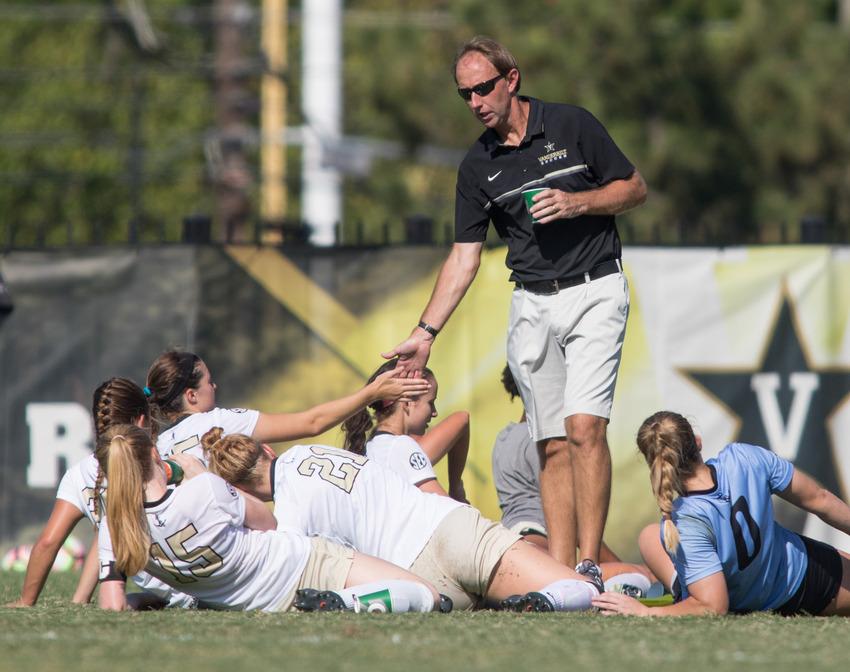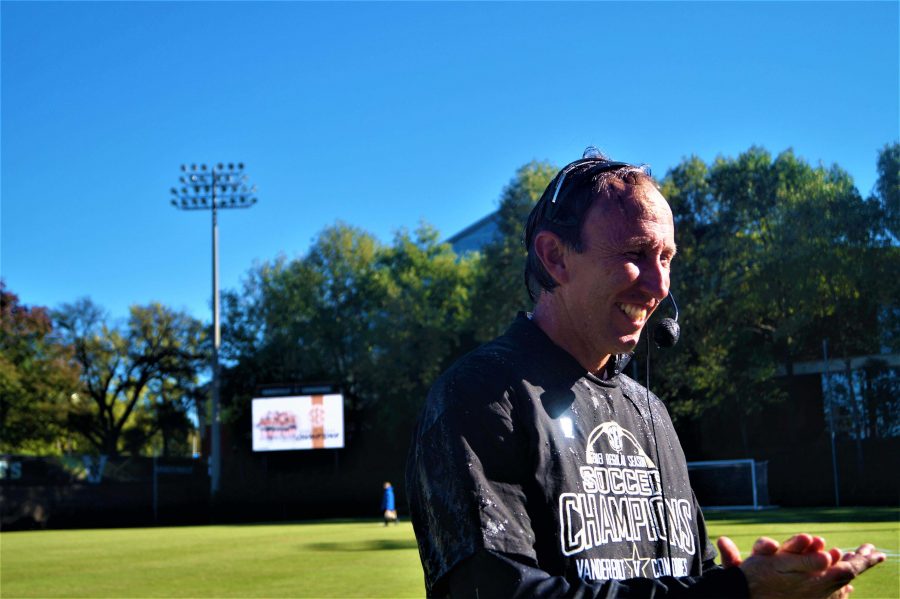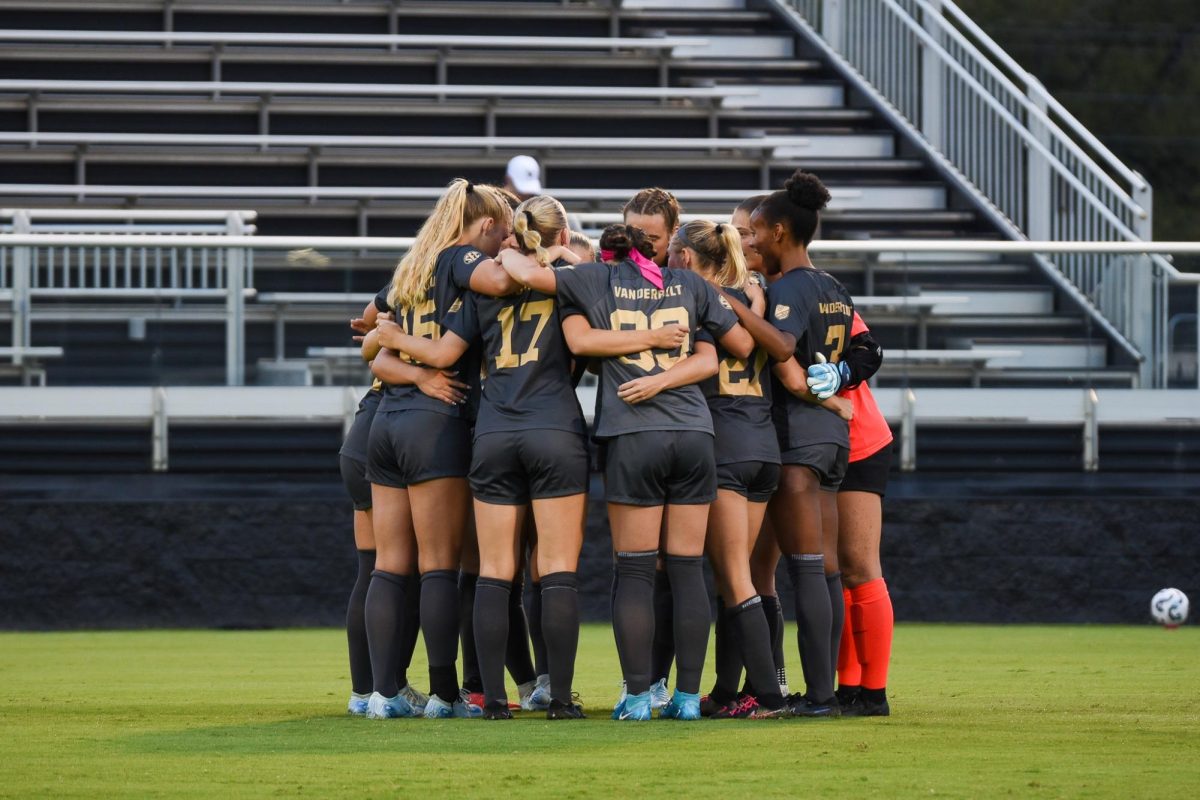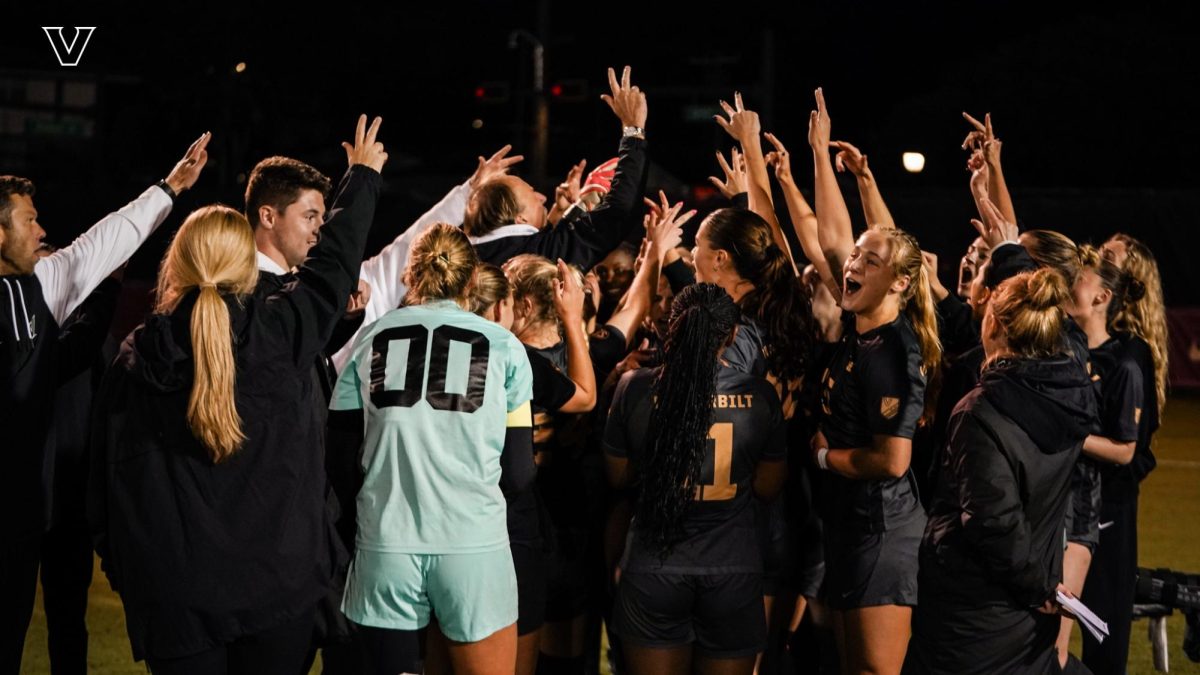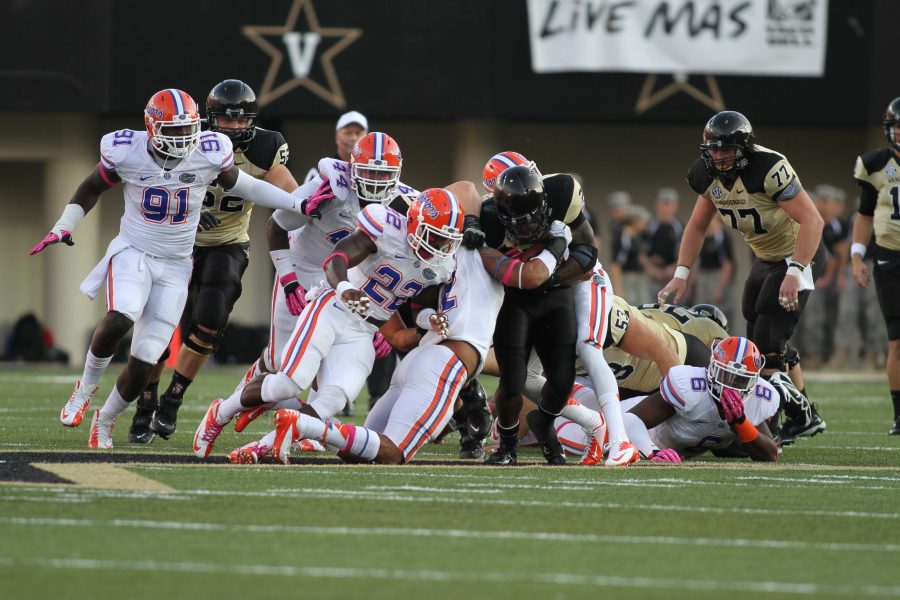Darren Ambrose didn’t come to Vanderbilt because it would be easy.
He came to create his own legacy, set his own tone, and ultimately build a soccer team that would make Commodore history.
Ambrose was named Vanderbilt’s head soccer coach in 2015, a title he had held for the past fifteen years at the University of Pennsylvania. At the time, Vanderbilt’s soccer program was trending in the wrong direction, finishing the 2014 season with a 7-10-2 overall record.
Turning things around was going to be a massive challenge. Luckily, a challenge was precisely what Ambrose was looking for.
Upon hearing about the job, Ambrose immediately pursued it: not for the money, not for Vanderbilt’s prestige, but for the challenge of reviving a program and creating his own legacy. There wasn’t much more work to be done at Penn; it was time for a new venture.
“Vanderbilt’s program needed a little tweaking, but I was so pleased that the school checked all my boxes,” Ambrose said. “I’d still have the ability to give kids the opportunity to attend an unrivaled institution that would forever change their lives. In addition, I would not be forced into a place where there was something to maintain, something to live up to. I would not want to be the next Duke basketball coach. I wanted a challenge, but I wanted to do things my way.”
It’s safe to say that doing things his way has paid dividends.
Ambrose immediately changed the fate of the program. In just his first year as head coach, the Commodores clinched a rare SEC tournament appearance, finishing the season with an overall record of 9-8-4.
If his first year wasn’t good enough, consider the sixteen-game unbeaten streak he has amounted just a few years later, shattering the eleven-game record held in 2005.
On top of that, with still one conference game left to play, the Commodores have clinched the SEC regular season championship for the first time since 1994. Ambrose was ecstatic after the win over Kentucky to seal the title, but he’s not finished yet.
“I’ve been tough on them to not celebrate a streak, not celebrating this,” he said. “We’ve joked that you’ve got till Monday morning at 7 and that’s all you’ve got. I want to let them celebrate. They deserve to and enjoy that this is special. This is magical. We will reconvene and we’ll set some different goals and we’ll stop talking about it come Tuesday.”
Starting this week, this emotional win must be put behind them. Ambrose is all business; he knows that it’s time to focus on the tasks ahead: Ole Miss, followed by the SEC Tournament, then eventually, the NCAA tournament.
In just three years, Ambrose has absolutely transformed the soccer program. They’ve gone from a has-been team in the SEC to an absolute powerhouse, and Ambrose deserves plenty of credit.
Before Ambrose and the rest of the Vanderbilt soccer team starts to look ahead to the next task, take a look at how he got to Music City.
From the freezing field to the piping-hot pitch

Darren Ambrose wasn’t forced to pursue a career in soccer.
His parents let him find his own path in sports in Sheffield, England, supporting him and and his choices. However, it was his Auntie Liz and Uncle Dave who really fostered his love for soccer.
Perhaps they were not aware of the love story she had written. Ambrose immediately fell in love with the game, particularly, with the art of goalkeeping. From then on out, Ambrose’s frequent memories on the pitch involved goalkeeping.
“I have loads of memories playing with my friends on what we called, ‘the field’. It wasn’t a park, it was, quite literally, a field,” Ambrose said. “There were no lines in it, the grass was extremely high, the conditions were absolutely brutal, but we used to go there and play after school every day.”
It was Ambrose who brought the ball every day to school, played the role of color commentator as they all scrimmaged, and tried to replicate the art of diving hard into the tough, cold grass simply to save the ball.
His experience on “the field” served as the backbone of his experience. After moving on to club soccer, Ambrose eventually began the college recruiting process. His process, however, was conducted in the least conventional manner possible: instead of waiting for recruitment letters and calls, he pursued the letters and calls himself, selling his own talents to the coaches.
“I’ve never been a guy to sit idly by and hope things happen to me,” he said. “If ever wanted something, or felt like I wanted to do something, or felt like I needed to achieve something, or even wanted the chance to play on a team, I went and got it done myself. So I started asking around.”
Ambrose sought any form of connection to a program in the United States. Coincidentally, one of his coach’s brothers, another former coach of his, had just embarked on a one-year coaching exchange program in America. After word got back that his college program at the University of South Carolina-Spartanburg needed a goalkeeper, things started to fall in place.
“It was almost like a blur,” Ambrose said. “One moment, I was making call after call, making connection after connection, the next moment, my coach’s brother, who happened to be the head coach at USC Spartanburg, was sitting in my living room.”
The offer was on the table. Ambrose had the opportunity to come to the United States and become a part of the USC Spartanburg team, one that provided him with the opportunities to travel, study, and most importantly, play football.
“I basically said to myself ‘I’m going,'” he said. “I swear to you, it wasn’t until after the decision I thought to myself, ‘What is South Carolina? Where in America is this place?’ I only knew about New York, Florida, South Carolina, and Los Angeles. I convinced myself that surely, it was like those other places.”
His single biggest challenge had little to do with the talent pool or playing styles. Ambrose was already used to older, more experienced, and far more physical competition from his days in Sheffield. Instead, it was the weather. As a goalkeeper, Ambrose found it incredibly difficult to move from soggy, cold, soft fields in England to 103-degree practices, where he was forced to dive around in a sand pit.
“I just remember writing letters home, complaining that it was eleven o’clock at night and still well over 95 degrees,” Ambrose said. “This took a long time to get used to, but I knew it was just another challenge I was willing to face. Eventually, I grew accustomed. I had gone from the wet, comfortable grass to the hard, hot boxes of sand. In fact, in my last two years, we were able to really make a name for ourselves as a program.”
Transitioning to the sidelines

Upon graduation from college, Ambrose took it upon himself to pursue a master’s in business. However, while taking classes at Memphis and serving as a part-time coach at Rhodes College, Ambrose realized he was not cut out for business.
“I quit my MBA about two months into it because I couldn’t stand the people I was around—seriously no disrespect to anyone in business, but I just felt the whole curriculum and everything we were talking about wasn’t about being a part of a team,” he said. “It didn’t align with my values; it wasn’t about doing the right thing for others, it wasn’t about doing your part for somebody else. It was all about yourself.”
Ambrose’s trajectory to Vanderbilt included a stint a part time assistant role at Rhodes college, followed by a low-level position at UConn before returning to Rhodes full-time, then moving up to a small role at a heralded division-one program in Florida State. From Florida State it was smoother sailing, as he moved on to become the head head coach at the University of Pennsylvania, then, 15 years later, to Vanderbilt.
Ever since Ambrose realized he wanted to be a coach, he took every word of advice he could get. At each position, he learned invaluable lessons from other coaches who have served as mentors to him.
As an assistant coach at Rhodes, Ambrose was getting paid $5,000 per year, while paying $8,000 for classes in sports administration and coaching. He helped out head coach Andy Marcinko with the soccer team, coaching two club teams, and working 9-10 weeks of camp in the summer. It was then, during his first stint at Rhodes, when Ambrose first realized what it took to be a head coach.
He rarely went home before 10 PM. When he did, it was only to order pizza and have a drink with the Marcinko. They would continue to talk about the soccer program through the night, only to wake up in the morning and do it all again.
“If you want to make a career in coaching, you have to take up another job, work 12-14 hours a day during the season, work all summer, I just learned all the intricate components that make up a collegiate program,” he said.
Years later, as an assistant coach for the UConn men’s program, Ambrose had the pleasure of reporting to Joe Morrone, one of the greatest college soccer coaches of all time.
UConn, like Rhodes, was plenty of work for Ambrose, but he finally learned how to cope. Morrone was one of the most organized people Ambrose had ever met, and Ambrose truly believes his organization led to efficiency. His organization and attention to detail was a science, one that Ambrose said “almost draws comparisons to an older Tim Corbin.”
The organizational skills Ambrose learned would come in handy in his second stint at Rhodes. Somehow, his second stint had more responsibilities than the first: he returned as the assistant men’s and women’s soccer coach, the assistant sports information director, and ironically, the softball coach.
“When I was hired back, the athletic director said to me, ‘I will never evaluate you based on the soccer team’s performance. I know how passionate you are, I know you love the kids, I know you are going to do a great job. I am going to evaluate you on how you do with the softball program, because I know it’s hard, I know you know nothing about it.’”
“It didn’t matter that it wasn’t my sport; I had finally received my first head coaching job. I was the coach brought in to start the program, I had to recruit in a sport I didn’t know, make a schedule, develop a budget, everything that goes with any head coaching position, I did, all in a sport I had absolutely no idea about. I had literally never even seen a game with a melon-shaped ball like that.”
This was perhaps the greatest lesson Ambrose learned in his time as a coach, for any sport, in any capacity.
“As long as your ego and pride don’t step in the way, you can do anything,” he said. “It’s not always a question of what you want to do, it’s a question of what you can do, what you need to do, given the opportunities presented to you.”
This is a lesson Ambrose still lives by. To this very day, he tells the Commodores that if they don’t get in their own way, they can accomplish anything. It doesn’t matter how big the task may be, nor does it matter what others may think your chances are. You have the power to change your fate.
That’s exactly what the Commodores have done this year. In the preseason, the Commodores were ranked ninth in the preseason SEC poll. They let nothing get in the way of success. With each and every opportunity presented, they didn’t consider what they wanted the outcome to be. They only considered what needed to be done for them to move forward.
Ambrose had originally made the connection to Duke basketball, stating that he wouldn’t want to be the next Duke basketball coach. Through just over three seasons, his Commodores have been so successful that one can only wonder: who will want to be the next Vanderbilt soccer coach?

